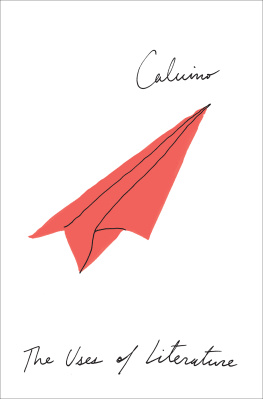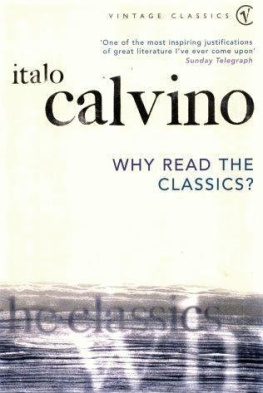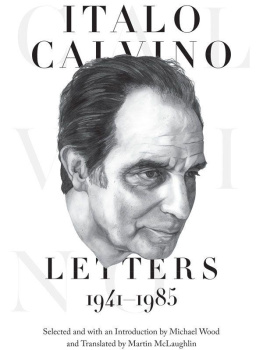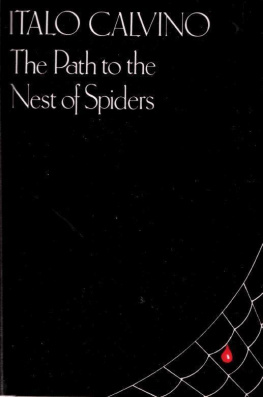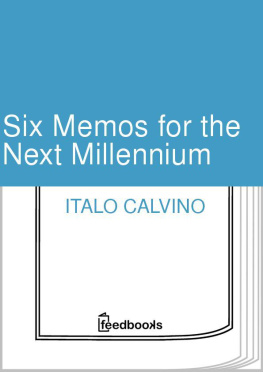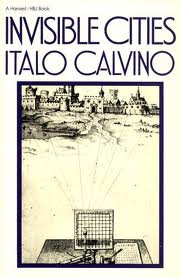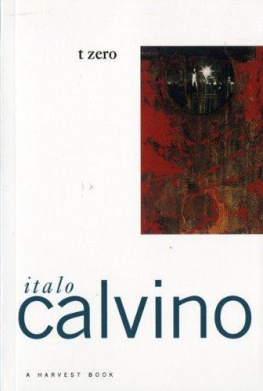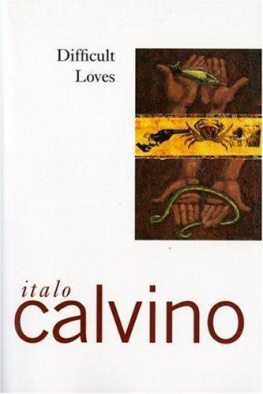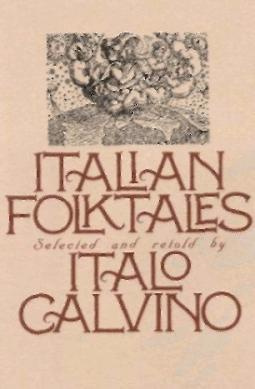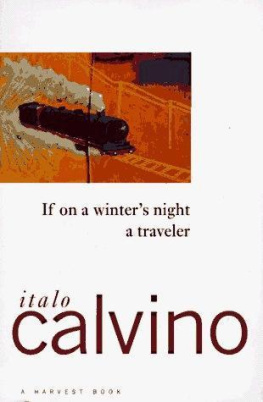Italo Calvino - The Uses of Literature
Here you can read online Italo Calvino - The Uses of Literature full text of the book (entire story) in english for free. Download pdf and epub, get meaning, cover and reviews about this ebook. City: New York, year: 1987, publisher: Harcourt Brace Jovanovich, genre: Art. Description of the work, (preface) as well as reviews are available. Best literature library LitArk.com created for fans of good reading and offers a wide selection of genres:
Romance novel
Science fiction
Adventure
Detective
Science
History
Home and family
Prose
Art
Politics
Computer
Non-fiction
Religion
Business
Children
Humor
Choose a favorite category and find really read worthwhile books. Enjoy immersion in the world of imagination, feel the emotions of the characters or learn something new for yourself, make an fascinating discovery.
- Book:The Uses of Literature
- Author:
- Publisher:Harcourt Brace Jovanovich
- Genre:
- Year:1987
- City:New York
- Rating:4 / 5
- Favourites:Add to favourites
- Your mark:
- 80
- 1
- 2
- 3
- 4
- 5
The Uses of Literature: summary, description and annotation
We offer to read an annotation, description, summary or preface (depends on what the author of the book "The Uses of Literature" wrote himself). If you haven't found the necessary information about the book — write in the comments, we will try to find it.
The Uses of Literature — read online for free the complete book (whole text) full work
Below is the text of the book, divided by pages. System saving the place of the last page read, allows you to conveniently read the book "The Uses of Literature" online for free, without having to search again every time where you left off. Put a bookmark, and you can go to the page where you finished reading at any time.
Font size:
Interval:
Bookmark:
Copyright 1982, 1980 by Giulio Einaudi Editore, S.p.A., Torino
English translation copyright 1986 by Harcourt Brace & Company
All rights reserved. No part of this publication may be reproduced or transmitted in any form or by any means, electronic or mechanical, including photocopy, recording, or any information storage and retrieval system, without permission in writing from the publisher.
For information about permission to reproduce selections from this book, write to or to Permissions, Houghton Mifflin Harcourt Publishing Company, 3 Park Avenue, 19th Floor, New York, New York 10016.
www.hmhco.com
These essays are translated from Una pietra sopra.
The Pen in the First Person, translated by William Weaver, first appeared in Saul Steinberg: Still Life and Architecture (New York: Pace Gallery, 1982). English translation copyright 1982 by William Weaver. Reprinted by permission.
Library of Congress Cataloging-in-Publication Data
Calvino, Italo.
The uses of literature.
A Helen and Kurt Wolff book.
1. Literature. I. Title.
PN37.C34 1986 800 86-4753
ISBN 0-15-193205-0
ISBN 0-15-693250-4 (Harvest: pbk.)
e ISBN 978-1-328-94499-3
v1.0617
Lecture delivered in Turin and other Italian cities, November 1967.
It all began with the first storyteller of the tribe. Men were already exchanging articulate sounds, referring to the practical needs of their daily lives. Dialogue was already in existence, and so were the rules that it was forced to follow. This was the life of the tribe, a very complex set of rules on which every action and every situation had to be based. The number of words was limited, and, faced with the multiform world and its countless things, men defended themselves by inventing a finite number of sounds combined in various ways. Modes of behavior, customs, and gestures too were what they were and none other, constantly repeated while harvesting coconuts or scavenging for wild roots, while hunting lions or buffalo, marrying in order to create new bonds of relationship outside the clan, or at the first moments of life, or at death. And the more limited were the choices of phrase or behavior, the more complex the rules of language or custom were forced to become in order to master an ever-increasing variety of situations. The extreme poverty of ideas about the world then available to man was matched by a detailed, all-embracing code of rules.
The storyteller began to put forth words, not because he thought others might reply with other, predictable words, but to test the extent to which words could fit with one another, could give birth to one another, in order to extract an explanation of the world from the thread of every possible spoken narrative, and from the arabesque that nouns and verbs, subjects and predicates performed as they unfolded from one another. The figures available to the storyteller were very few: the jaguar, the coyote, the toucan, the piranha; or else father and son, brother-in-law and uncle, wife and mother and sister and mother-in-law. The actions these figures could perform were likewise rather limited: they could be born, die, copulate, sleep, fish, hunt, climb trees, dig burrows, eat and defecate, smoke vegetable fibers, make prohibitions, transgress them, steal or give away fruit or other thingsthings that were also classified in a limited catalogue. The storyteller explored the possibilities implied in his own language by combining and changing the permutations of the figures and the actions, and of the objects on which these actions could be brought to bear. What emerged were stories, straight forward constructions that always contained correspondences or contrariesthe sky and the earth, fire and water, animals that flew and those that dug burrowsand each term had its array of attributes and a repertoire of its own. The telling of stories allowed certain relationships among the various elements and not others, and things could happen in a certain order and not in others: prohibition had to come before transgression, punishment after transgression, the gift of magic objects before the trial of courage. The immobile world that surrounded tribal man, strewn with signs of the fleeting correspondences between words and things, came to life in the voice of the storyteller, spun out into the flow of a spoken narrative within which each word acquired new values and transmitted them to the ideas and images they defined. Every animal, every object, every relationship took on beneficial or malign powers that came to be called magical powers but should, rather, have been called narrative powers, potentialities contained in the word, in its ability to link itself to other words on the plane of discourse.
Primitive oral narrative, like the folk tale that has been handed down almost to the present day, is modeled on fixed structures, on, we might almost say, prefabricated elementselements, however, that allow of an enormous number of combinations. Vladimir Propp, in the course of his studies of Russian folk tales, came to the conclusion that all such tales were like variants of a single tale, and could be broken down into a limited number of narrative functions. Forty years later Claude Lvi-Strauss, working on the myths of the Indians of Brazil, saw these as a system of logical operations between permutable terms, so that they could be studied according to the mathematical processes of combinatorial analysis.
Even if the folk imagination is therefore not boundless like the ocean, there is no reason to think of it as being like a water tank of small capacity. On an equal level of civilization, the operations of narrative, like those of mathematics, cannot differ all that much from one people to another, but what can be constructed on the basis of these elementary processes can present unlimited combinations, permutations, and transformations.
Is this true only of oral narrative traditions? Or can it be maintained of literature in all its variety of forms and complexities? As early as the 1920s, the Russian Formalists began to make modern stories and novels the object of their analysis, breaking down their complex structures into functional segments. In France today the semiological school of Roland Barthes, having sharpened its knives on the structures of advertising or of womens fashion magazines, is at last turning its attention to literature; the eighth issue of the magazine Communications was devoted to the structural analysis of the short story. Naturally enough, the material that lends itself best to this kind of treatment is still to be found in the various forms of popular fiction. If the Russians studied the Sherlock Holmes stories, today it is James Bond who provides the structuralists with their most apt exemplars.
But this is merely the first step in the grammar and syntax of narrative fiction. The combinatorial play of narrative possibilities soon passes beyond the level of content to touch upon the relationship of the narrator to the material related and to the reader: and this brings us to the toughest set of problems facing contemporary fiction. It is no coincidence that the researches of the French structuralists go hand in hand (and sometimes coexist in the same person) with the creative work of the Tel Quel group. For the latterand here I am paraphrasing statements by one of their authorized interpreterswriting consists no longer in narrating but in saying that one is narrating, and what one says becomes identified with the very act of saying. The psychological person is replaced by a linguistic or even a grammatical person, defined solely by his place in the discourse. These formal repercussions of a literature at the second or third degree, such as occurred in France with the
Next pageFont size:
Interval:
Bookmark:
Similar books «The Uses of Literature»
Look at similar books to The Uses of Literature. We have selected literature similar in name and meaning in the hope of providing readers with more options to find new, interesting, not yet read works.
Discussion, reviews of the book The Uses of Literature and just readers' own opinions. Leave your comments, write what you think about the work, its meaning or the main characters. Specify what exactly you liked and what you didn't like, and why you think so.

